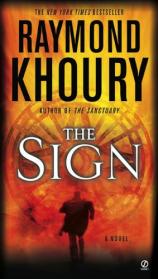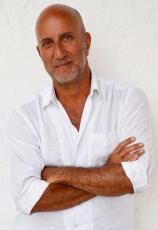Author Talk: May 22, 2009
In this interview, Raymond Khoury --- author of the bestsellers THE LAST TEMPLAR and THE SANCTUARY --- discusses what inspired his latest thriller, THE SIGN, and explains how he researched specific types of technology in order to portray it in a realistic and feasible manner. He also comments on the muddled line that separates religion and politics in today's society, and shares his thoughts on movie and mini-series adaptations of his books.
SPOILER ALERT: Please avoid reading this interview before you've read the book.
Question: THE SIGN is somewhat of a departure from your previous books. Where did you get the idea for the book?
Raymond Khoury: I was watching the news one day, feeling frustrated by all the wars and fighting going on in different parts of the globe, all of them fuelled by religious and tribal fanaticism, and I thought, wouldn’t it be great if something amazing could happen, some supernatural event that forced us all to rethink everything, made us drop all previous allegiances and united us all under a common flag, the flag of humanity. Could that ever happen, or does human nature preclude any such utopia? How long would it take for something that idealistic to break down and for us to revert to the greed-driven squabbles that have fuelled us from day one? Anyway, that was the initial trigger to the story…and it evolved from there into something very different....
Q: The story jumps around from Antarctica to Boston, from Egypt to Houston. How did you pick these locations?
RK: The locations always impose themselves by the nature of the story, they come out of my research. I don’t sit back and think, hey, I feel like setting something in Greece or in Naples. In this case, well, Antarctica is the place we’re most worried about in terms of ice shelves breaking off. Egypt is where the world’s oldest monasteries are located. As for Boston, well it was either going to be Silicon Valley or Boston, the two centers of tech companies, and Boston worked better in terms of logistics, time differences, that kind of thing.
Q: Science and technology play a major role in the book. What kind of research did you do for the book?
RK: I always need to make sure that whatever I’m imagining in the books is technically feasible --- something that, in this case, was easier said than done. I ended up doing a lot of research into nanotechnology and Janus particles and self-assembly once that turned out to be a possible way of achieving it. And as has happened before, one of my buddies who I was talking to about it had a friend who was a huge nano-techie, the CEO of one of the leading firms in that field. He hooked us up, long and detailed phone calls and e-mails ensued, a nice meal or two, and we eventually figured out how to do it.
Q:The role of religion in politics is a central theme in the book. Why do you think they often go hand-in-hand?
RK: It’s an easy button to push when you’re looking to grab power. It whips up people’s emotions and gets them motivated and angry, and the effects are spectacularly effective --- and very dangerous. A voter is much more likely not just to get off his butt and vote, but to vote in a particular way, if he thinks it’ll help get him into heaven for eternity. And a soldier will be much more ruthless if he thinks he’s doing God’s work, if he believes he’s defending land or a set of rules that God bequeathed to “his people.” Religion is the perfect motivator. Look at what’s happening in many parts of the world. The fanatical few are dictating how the more open-minded --- and more passive --- majority are living. It’s very depressing to think this fanaticism can still have such a huge influence in the twenty-first century…but it is, and it’s getting worse.
Q: In the book, “the sign” that appears has the potential to change the way the whole world lives and believes. Do you think that could happen in today’s society?
RK: I do, in the sense that I think we’re instinctively naïve when it comes to God and his various representatives on earth, and if something came along that was so powerfully convincing, a lot of us --- enough of us --- would get swept up in it. We need to. Sadly, we seem to have an urge to be followers.
Q: Your first book, THE LAST TEMPLAR, was recently made into an NBC mini-series. Was it exciting to see your work come to life, and will we see THE SANCTUARY or THE SIGN on a small or big screen soon?
RK: You know, I find it hard enough to watch things I’ve actually written once they’re filmed, given that I’ve already “seen” them in my mind while writing them and, short of directing them and casting them myself, they never turn out to look anything like how I imagined them. With The Last Templar, it was even less of a match, given that I didn’t write the screen adaptation and that I wasn’t at all involved in the production. It’s early to talk about THE SIGN given that it isn’t even out yet, but a couple of producers are trying to set up THE SANCTUARY as a movie. I’ve said I need to know who’s going to write the screenplay, and who’s going to direct, before I say yes. If I have the time, I’d love to be more involved this time around, but even that’s a tough call because you have to accept that adaptations are inherently going to be different from the books. As far as I’m concerned, I get to tell the stories I want to tell, the way I want to tell them, in the books. The movies or the miniseries will inevitably be different, for better or for worse. A lot of people will get involved, everyone will have different tastes and opinions and egos. It’s always a minefield of emotions when it comes to screen adaptations.
© Copyright 2009, Raymond Khoury. All rights reserved.
Click here now to buy this book from Amazon.com.




